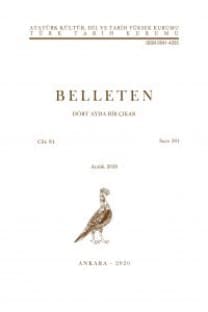Havza'da Mustafa Kemal Paşa
Küçük Havza kasabası Mustafa Kemal'in orada isyan bayrağını açmış olması gibi bir şerefe sahiptir. Şu var ki, onun 1927 yılı Nutkunda söylemiş olduğu şu sözler de dikkate alınmak lazımdır. "Çarei halâs ararken iki şey mevzuubahs olmıyacaktı. Bir defa İtilâf Devletlerine karşı vaz'ı husumet alınmıyacaktı ve padişah ve halifeye canla başla merbut ve sadık kalmak şartı esasî olacaktı." Demek ki, Mustafa Kemal yalnız bir inkılapçı değil, aynı zamanda mükemmel bir diplomattı. Fikirlerini maharetle saklamasını biliyordu.
Anahtar Kelimeler:
Mustafa Kemal Atatürk, Havza, Milli Mücadele, İstiklal Harbi, 19 Mayıs 1919, VI. Mehmed Vahîdeddin
Remnants of Theophoric Names in Turkic Name Giving
In my study entitled "The Psychology and Categories of Name Giving Among the Turkish Peoples" (Hungaro - Turcica, Budapest 1976, pp. 207-223) I divided Turkic personal names into six major groups, and within these groups further 14 categories of men's names and a couple of women's names were distinguished. A very important semantic category of Turkic names is that of the theophoric names. In my Onomasticon Turcicum in preparation, more than sixty data are collected from different ages and different Turkic peoples for the name Töngri - berdi "God - giyen" (in their corresponding forms), partly they are names of historical persons. The name of "God" could be substituted by different words, thus e. g. Ogan - berdi (A. v. Le Coq, Türkische Namen in Indien: GarbeFestgabe, 1927), in the Islamic cultural sphere Allah - virdi (Abramzon, Rozdenie kirgizskogo rebenka: Sbornik Muzeja Antropologii i Etnografii XII, 1949, p. 107) and Quday - berdi (Abramzon, I . c.). The latter two names served as basis for Russian patronymika such as Allahberdiev (ein Chivaer in 1793: A. f. w. K. v. R. XVIII, p. 352), Quday - Berdiev (Turkmen name in 188o: Grodekov, Vojna IV. Pri1o2enie, p. 39). The name Töngri - berdi itself has a variant Tagribirdi on Arabic soil, e. g. the great historian of the Mamelukes was called Abul Mahasin Ibn Tagribirdi (1411-1469). In the Arabic chronicle of this Ibn Tagribirdi, in the period between 1441 and 1469, sixteen such names are registered, and the same abundance of data is characteristic of another famous Mameluke historian Ibn Iyyâs.
Keywords:
Theophoric Names, Turkish, Name Giving, Name of God,
- ISSN: 0041-4255
- Yayın Aralığı: Yılda 3 Sayı
- Başlangıç: 1937
- Yayıncı: Türk Tarih Kurumu
Sayıdaki Diğer Makaleler
1939 Türk-İngiliz-Fransız ittifakı
Anadolu'da Ahilik ve Bunun Kurucusu Ahi Evren
Dımaşk Selçuklu Melikliği - Şemsül-Mülûk Dukak Devri (1095-1104)
Guma isyanı öncesinde Fransa'nın Trablusgarb Siyaseti
Hititlerin Dinsel Törenlerinde Kullanılan Temizlik Maddesi TUḪḪUEŠŠAR Üzerine Bir İnceleme
